The Last Corporate Taboo Is Ready To Be Broken, It’s Time Companies Share Salaries And Total Compensation
When I was a kid, in social settings, my dad would ask people what they do for a living. He’d then innocently inquire, “How much does a job like that pay?” The recipient of the question and everyone within earshot would cringe. I was used to it, and 20-plus years later I’m asking the same questions to people as a recruiter.
He wasn’t being an insensitive, rude jerk. My father was a school teacher in Brooklyn and later went into administration. He always felt that he was in the wrong profession as it paid substantially less than what peers earned in the private sector. He was curious about just how much less he earned and what other types of careers paid.
We’re in the time period that salaries, raises, promotions, bonuses and annual reviews come into play. This is the right moment for a conversation about making salaries transparent. In a move that may ultimately lead to salary disclosures, the Wall Street Journal reported on a trend in which companies are “setting pay without regard for location.” The WSJ wrote, “The move can entail maintaining relatively high salaries of employees who are relocating, and adopting a revised scale for new hires.” By offering the same amount of money to an employee who decides to relocate and work in Oshkosh, Wisconsin or stay in Silicon Valley, California the compensation for roles will have to be disclosed to make this program effective.
Business Insider recently revealed the salaries—exclusive of bonuses, stock, stock options and other remuneration—of Robinhood employees. If you’re not familiar with the company, it’s a super fast-growing trading app that millennials and Gen-Z novice investors love. The online trading platform skyrocketed in popularity during the pandemic. Here’s some of the salaries:
Software engineers in California earned between $121,000 to $252,000 per annum and a manager nearly $350,000.
A Data Scientist could take home up to about $236,000 a year.
Project managers make roughly $167,000.
The lowest salary is $117,000.
Discussing salaries is the one of the last business taboos. We share everything about ourselves on social media. It’s understood and accepted Facebook, Google and other social media sites know all about us, including our weird, fetish search habits. The Government is probably watching you right now. But, talking about salaries is verboten.
If we were all open and honest about salaries, it would help matters. As a recruiter, job seekers regularly vent and complain to me that they’re severely underpaid. They’ll point to a colleague—let’s call him ‘Kevin’—and say, “I heard Kevin just got a job offer for $150,000?!” The job seeker would angrily say, “Kevin is a third-tier player and if he’s earning $150k I should get $200,000!” Since I placed Kevin, I have firsthand knowledge he only received $115,000 and embellished the rest.
Since there is very little opaqueness and transparency with respect to salaries, it leads to frustration, hurt feelings and beliefs that they’re being taken advantage of or discriminated against. If you go onto ‘salary’ websites, in my opinion, their data is ridiculously inaccurate.
My humble suggestion is that companies should disclose salaries, benefits, options, stock grants, vacation days and all other remuneration. It would shed direct light on what is really happening in the marketplace. Instead of believing that there is rampant gender, race, religious and age disparities in compensation, we’d know definitively if certain groups are being taken advantage of and shortchanged.
“How much do you make?” was the go-to question asked by recruiters, human resources and hiring managers at the onset of the interview process. You’d have to include your prior salary history on the job application and other forms. This has radically changed.
Many (not all) states previously passed laws that prohibit companies from asking what a job seeker currently earns and what she made in prior years. The law was enacted, in part, to close the controversial “gender-based pay gap” between men and women. Another rationale for the legislation was to address the perceived unfairness of a job applicant held prisoner to his or her current salary. Fortunately for many job seekers, these days are over.
If salary information was made public, you could compare Jane to employee John in the same company, city or job to determine if there’s a discrepancy. We can’t count on vague averages that you’ll find online as the results are skewed. For instance, if you average the compensation of Jeff Bezos, Mark Zuckerberg, Elon Musk and 100 teachers, the data may reflect that the average person earns roughly $100 million a year and has a net worth of over $2 billion.
Openly available knowledge of salaries would offer much needed intelligence to employees to enable them to make important career decisions. They may assume a certain profession pays handsomely, only to find out that after four years of college and two more in graduate school with $225,000 in student debt that their chosen profession doesn’t pay well enough to pay back the tuition loans, rent an apartment and earn a reasonable living. If people are underpaid relative to their peers, they could speak up and register a complaint with their boss.
If we can get past this taboo of discussing money, we’d all benefit. It would open the door to real and honest conversations. My dad, later in life, moved with my mom to one of those senior communities. He found out that while he earned a lower salary compared to his contemporaries, his union benefits and pension far surpassed the “smarter” ones in the private sector.
By having salary and compensation information open and available to everyone better more informed career decisions and job moves could be made. It would also shed light on any inequities.



